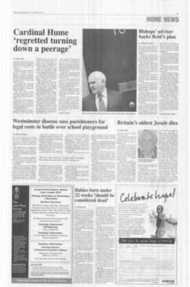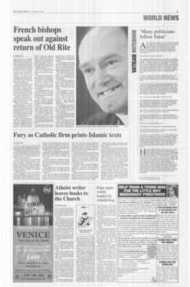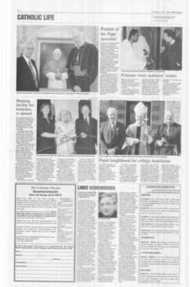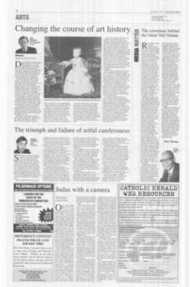Page 2, 27th October 2006
Page 2
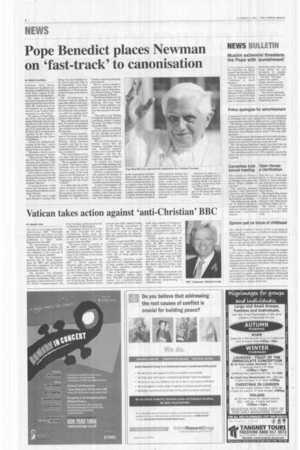
Report an error
Noticed an error on this page?If you've noticed an error in this article please click here to report it.
Tags
Share
Related articles
Sainthood Looms For Newman
Miracle Puts Newman A Step Nearer To Beatification
Newman Exhumation Fails To Produce Body
Cardinal Newman To Lie In State In Birmingham
Cardinal Says Newman Should Be A Doctor Of The Church
Pope Benedict places Newman on 'fast-track' to canonisation
BY SIMON CALDWELL CARDINAL JOHN Henry Newman is to be placed on a fast-track to sainthood because of the Pope's support for his canonisation, it has emerged.
The cause of Cardinal Newman is expected to take a huge leap forward next month when the conclusions of an investigation into an alleged miracle in the United States are passed on to the Vatican.
The interest of Pope Benedict XVI, who has greatly admired Newman since he was introduced to the work of the 19th-century theologian at the age of 18, means the case will be dealt with as an immediate "priority" by the Vatican 's Congregation for the Causes of Sainthood.
"Causes for sainthood are coming all the time," said a soture in Rome yesterday who did not want to be named.
"Newman is likely to go to the front of the queue," he said.
"This is because Pope Benedict XVI has studied Cardinal Newman since January 1946 and has been interested in him since. Pope Benedict has a personal interest in this case."
If the Vatican confirms the claims of a first miracle it will mean that Newman can then be beatified, when he will be declared "Blessed".
A second miracle would mean that Newman would become the first British saint in about 40 years.
"If all went well I would look forward to seeing John Henry Newman beatified by the end of next year. That is not impossible," said Peter Jennings, spokesman for the Archdiocese of Birmingham, where Newman spent much of his life.
The breakthrough in Newman's cause for sainthood came after officials in the Archdiocese of Boston concluded that Jack Sullivan, a deacon from Plymouth, Massachusetts, was cured of a (-Tippling spinal condition through the intercession of the cardinal.
They will formally wrap up their 18-month investigation on November 9 and their findings will then be sent to Rome the day after.
Fr Paul Chavasse, the postulator of Newman's cause and provost of the Birmingham Oratory, which Newman founded, said that he was "really delighted" that the initial phase of the prncess had been completed.
"This is the furthest we have ever gone with advancing the cal Ise for beatification," he said.
"We are quietly confident," he added. "The Pope is extraordinarily keen on Cardinal Newman so I am sure he would be happy if the work done by the Archdiocese of Boston was upheld by the Congregation for the Causes of Saints."
It is likely that any beatification ceremony would take place in either London or Birmingham because Pope Benedict has delegated beatifications to the national Churches instead of performing them himself.
But if a second miracle is approved, Newman will be declared a saint by Pope Benedict himself during a canonisation ceremony in Rome.
The Boston tribunal was set up in June last year after Mr Sullivan, who was "bent double" by his condition, was able to "walk about straight" again after praying to the cardinal.
"One night, I was flicking through the channels and saw something about Cardinal Newman," the father of three said at the time.
"I knew little or nothing about him. But I watched it all the way through and started praying to him and my life was changed."
The end of the process in Boston means that all witnesses, including doctors who examined medical records, have provided their testimonies and that the evidence is strong enough to send to the Vatican.
To qualify for Church approval alleged healings must be instant, enduring and devoid of any natural explanation.
In Rome, a panel of doctors will examine the findings of the Boston tribunal to ensure that there is no conventional scientific reason for the healing.
A panel of theologians will then determine whether the healing is consistent with the teaching of the Church on the nature and purpose of miracles. The cardinals who make up the congregation must then approve the case. Finally, Pope Benedict himself must give his assent. Cardinal Newman was an Anglican vicar who led the Oxford movement in the 1830s to draw Anglicans to their Catholic mots before becoming a Catholic himself at the age of 44 after a succession of clashes with Anglican bishops had made him an outcast from the Church of England. He courted fresh controversy among Catholics who considered him with distrust and his attempts to open an Oratory at Oxford and a university in Dublin were sabotaged by his Catholic enemies. However, his talent as a a theologian combined with his resolution though decades of suffering finally won him his cardinal's red hat from Pope Leo XIII in 1879.
When he died in 1890 at the age of 89 almost the whole Christian world mourned for him.
blog comments powered by Disqus




